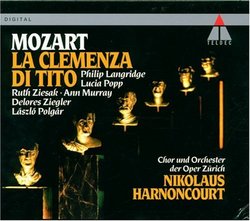| All Artists: Wolfgang Amadeus Mozart, Zurich Opera-house Chorus & Orchestra, Nikolaus Harnoncourt, Lucia Popp, Ann Murray, Philip Langridge, Delores Ziegler, Ruth Ziesak, Laszlo Polgar Title: Mozart: La clemenza di Tito / Harnoncourt Members Wishing: 0 Total Copies: 0 Label: Warner Music France Release Date: 3/8/1994 Album Type: Import Genre: Classical Styles: Opera & Classical Vocal, Historical Periods, Classical (c.1770-1830) Number of Discs: 2 SwapaCD Credits: 2 UPC: 745099085728 |
Search - Wolfgang Amadeus Mozart, Zurich Opera-house Chorus & Orchestra, Nikolaus Harnoncourt :: Mozart: La clemenza di Tito / Harnoncourt
 | Wolfgang Amadeus Mozart, Zurich Opera-house Chorus & Orchestra, Nikolaus Harnoncourt Mozart: La clemenza di Tito / Harnoncourt Genre: Classical
|
Larger Image |
CD Details |
CD ReviewsBeautiful recording Rafael T. Beckford | New York, NY | 06/19/2000 (4 out of 5 stars) "I am so sorry that I discovered this work by Mozart until recently. I have been captivated by his operatic work, and just started listening to La Clemenza di Tito about a month ago. It's definately a masterpiece, and this recording shows it. If you'd like to have an introduction to this last of Mozart's operas, choose this recording, it has beautiful sound quality and voices. Grabawski and the chorus are amazing." Wonderful rendition of La Clemenza Rafael T. Beckford | 01/15/2002 (5 out of 5 stars) "Excellent piece of recording. An under-rated opera that deserves to be among Mozart's top operas. The Swiss orchestra sounded crisped and very precised right from the first note to the last. This recording also is Lucia Popp's last before she departed from the world. At 60+, she still sings Vitellia so convincingly seductive. The rest of the cast are pretty good as well. And as usual, the Teldec sound is very balanced and natural. A must-have for anyone who wants to get La Clemenza!!!" Stunning music FrKurt Messick | Bloomington, IN USA | 08/19/2004 (5 out of 5 stars) "When the average music fan, even those reasonably well-versed in opera, are asked to list the major Mozart operas, this particular piece -- La Clemenza di Tito -- rarely gets mentioned. However, it is a stunning piece, under-appreciated and under-performed. It is Mozart's last opera (most people popularly think that is 'The Magic Flute'; however, 'Magic Flute' is no. K620, whereas 'La Clemenza' is no. K621 in the catalogue of Mozart's compositions.
Mozart needs no introduction, as one of the best composers in history, particularly in the area of opera. Perhaps one of the reasons 'La Clemenza di Tito' is not as well known is that it seems to fall outside Mozart's progression of operatic development -- however, as one scholar remarks, in fact this type of opera seria was popular in Italy at the time of Mozart's composition, and the deliberate simplicity of the work can be misleading. Conductor Harnoncourt dismisses the idea that Mozart reverted back to older forms of Baroque opera seria, instead crafting something new here in a simpler idiom, anticipatory of later nineteenth century developments (Harnoncourt cites Verdi here as an example). The story is an aristocratic one (the title character, Tito, is actually the Roman Emperor Titus; the story turns on many loves and counter-loves between major characters, which includes a plot by Vitellia, daughter of the former emperor, to murder the new emperor Tito because of his rejection of her. In the end, many are implicated and Sesto is condemned to die; Vitellia agonises over whether or not to intervene, and Tito in the end pardons them all (the clemency of the title) -- of course, the real historical Titus was not the figure of clemency portrayed here. The production qualities here are superb. The Zurich Choir and Orchestra, under the conduct of Nikolaus Harnoncourt and choirmaster Karl Kamper are wonderful; the lead voices include English tenor Philip Langridge (Tito), Lucia Popp (Vitellia), Ruth Ziesak (Servilia), Ann Murray (Sesto), Delores Ziegler (Annio), and Laszlo Polgar (Publio). This was Popp's last operatic recording. The parts of Sesto and Annio, both sung by female voices here, would have gone originally to castrati. This is an opera that is making a comeback of sorts, and this is a superb recording by which to gain acquaintance. Written for an aristocratic audience and event, it was also accepted by the popular audience, as Mozart wrote in a letter home, 'the crowd applauds every number'. The final night of the performance of 'La Clemenza di Tito' was apparently the opening night of 'The Magic Flute', as fate would have it. " |

 Track Listings (23) - Disc #1
Track Listings (23) - Disc #1